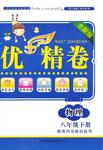
短文改错,对短文中标有题号的每一行作出判断,并改正错误:该句多一个词:把多余的词用斜线(\)划掉,在该行右边横线上写出该词,并也用斜线划掉;该句缺一个词:在缺词处加一个漏字符号(^),在该行右边横线上写出该加的词;该句错一个词:在错的词下划一横线,在该行右边的横线上写出改正后的词。
My mother has done so many for me! She gets up 1.
early every morning to make a breakfast for me. 2.
And she often wake up in the middle of the night 3.
to see if I’m sleeping well. Once, when I am ill, I couldn’t 4.
eat. Mum was so worried that she wouldn’t eat, too. 5.
 优加精卷系列答案
优加精卷系列答案科目:初中英语 来源: 题型:
单词拼写
根据句义完成句中已给出首字母的单词。将每个完整的单词写在各小题右边的横
线上。
1. Han Mei was on her way home. She saw an old woman at the bus s_________.
2. The little girl looked at the entrance w__________ because she
couldn’t find her mom.
3. My watch doesn’t w_________. Can you tell the time?
4. Tomorrow will be r___________. You should remember to bring an
umbrella to school.
5. I see movies with my friends o______ a week.
查看答案和解析>>
科目:初中英语 来源: 题型:
My science teacher told us that the earth around the sun.
A. move B. goes C. went D. travel
查看答案和解析>>
科目:初中英语 来源: 题型:
One of this summer’s hottest books is “That Guy Was Cool.” Sounds like a great book for kids, doesn’t it? But parents and teachers want to read this one, too. It can teach them something about the language of today’s kids.
So lots of people, young and old, went to see the book’s author, 19-year-old Korean girl Guiyeoni, on Saturday. She was in Beijing to sign books for her fans.
“Guiyeoni wrote a story that is near to us and goes to our hearts,” said a Junior 2 student in Beijing. “When I read it, I laughed and I cried.”
Like the “Meteor Garden” TV series, “That Guy Was Cool” tells an unusual story of love between two students. The girl is sweet, but she’s just average(一般的). The boy is good-looking and has everything, but he is often unhappy because his father died when he was very young. They become close and help each other to be happy. In the end, they fall in love.
“The girl in the book is like me. She’s simple and moody,” said Guiyeoni.
Guiyeoni’s book doesn’t only use words. It also uses things like emotions. Emotions are small icons, like smiling faces, and they are used to show emotions. Kids know what these things mean, because they often use them when they talk on the Internet or send messages with mobile phones.
Guiyeoni said she wrote this way because of her young readers. “Writing with pictures is vivid(生动)and can say a lot of things,” she said.
Guiyeoni began writing the book’s story on the Web in 2001 when she was a Senior 2 (高二)student. Last year, she put that online story together to make this book. “That Guy Was Cool” has been made into a film, and it will come out in Korea next month.
This is Guiyeoni’s first of four books, and she hopes to keep writing as she goes through college.
She also has a message for young writers. “I think that if they try hard, lots of young people can do this.”
1. Guiyeoni is .
A. a girl who falls in love with her classmate B. the author of “Meteor Garden”
C. a young writer D. one of the emotions
2. Which of the following may Not be an emotion?
A. 8-) B. :-) C. See you. D. :-(
3. The author used emotions to write the book because .
A. she really likes them B. she wants her young readers to be interested
C. pictures can say lots of things
D. she was only a Senior student when she was writing the story
4. Which of the following sayings has the closest meaning to “I think that if they try hard, lots of young people can do this”?
A. Seeing is believing. B. Time flies.
C. No news is good news. D. Where there is a will, there is a way.
查看答案和解析>>
科目:初中英语 来源: 题型:
—Are Li Yan and Wang Mei still living in Pingba? —No, they ____ to Shanghai.
A. had moved B. moved C. will move D. have moved
查看答案和解析>>
科目:初中英语 来源: 题型:
Last year I went to Beijing and ________ it.
A.fell in love with B.fell love with C.fall love in D.fell in love to
查看答案和解析>>
湖北省互联网违法和不良信息举报平台 | 网上有害信息举报专区 | 电信诈骗举报专区 | 涉历史虚无主义有害信息举报专区 | 涉企侵权举报专区
违法和不良信息举报电话:027-86699610 举报邮箱:58377363@163.com